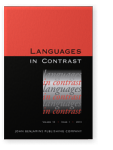Vol. 13:1 (2013) ► pp.90–112
Author manifestation and perceptions of self in Chinese academic discourse
Comparisons with English
This paper examines the manifestation of authorial identity in research articles by contrasting the phenomenon across two languages (English and Chinese) and three fields (Literature, Education, Chemistry). The study seeks to find patterns governing the use of self-mention devices among native Chinese and English writers, and to explain such patterns in terms of the Chinese perception of self. Based on a corpus-based investigation of pronominal and depersonalized forms of self-mention involving 180 research articles, the paper suggests that Chinese authors have a stronger tendency to use depersonalized forms over pronominal forms than their English counterparts. It is also found that in using first-person pronouns, Chinese authors in single-authored papers have a salient preference for the plural form, in particular the inclusive plural pronoun as compared to English authors. The paper attempts to link the linguistic phenomenon to the concept of the interdependent self inherent in Chinese social psychology, and proposes possible applications to research in bilingual scholarly writing and academic translation.
Cited by
Cited by 3 other publications
This list is based on CrossRef data as of 5 july 2024. Please note that it may not be complete. Sources presented here have been supplied by the respective publishers. Any errors therein should be reported to them.
